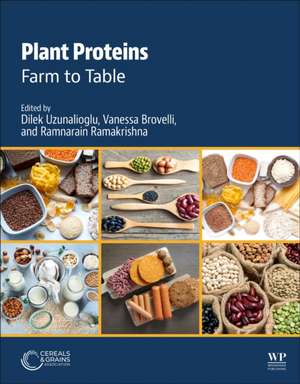Plant Proteins: Farm to Table
Editat de Dilek Uzunalioglu, Vanessa Brovell, Ramnarain Ramakrishnaen Limba Engleză Paperback – iun 2025
It will be a welcomed addition to the libraries of food technologists, research scientists, product developers, process engineers, students and educators.
- Includes nutritional claims and calculations for individual countries supported with examples
- Presents methods and techniques for evaluations of plant-based foods
- Provides descriptions and comparisons of types of plant proteins
- Contains application case studies pertaining to ingredient insights, formulation tips, and food processing challenges and solution
- Provide insights on plant protein ingredient processing
Preț: 1128.39 lei
Preț vechi: 1481.31 lei
-24% Nou
Puncte Express: 1693
Preț estimativ în valută:
215.93€ • 223.10$ • 179.62£
215.93€ • 223.10$ • 179.62£
Carte nepublicată încă
Doresc să fiu notificat când acest titlu va fi disponibil:
Se trimite...
Preluare comenzi: 021 569.72.76
Specificații
ISBN-13: 9780323917254
ISBN-10: 0323917259
Pagini: 400
Dimensiuni: 152 x 229 mm
Editura: ELSEVIER SCIENCE
ISBN-10: 0323917259
Pagini: 400
Dimensiuni: 152 x 229 mm
Editura: ELSEVIER SCIENCE
Public țintă
Industry professionals working to develop and commercialize ingredients for plant-based foods, such as food technologists, research scientists, product developers, and process engineers as well as students and educators in food science programs and food-processing programsCuprins
Section 1: Introduction to Plant-Based Proteins as Food Ingredients
1. Plant-Based Proteins: Definitions and Types
2. Consumer Trends, Nutrition, and Sustainability
3. Advancements in Plant Sciences, Genetics, and Breeding
4. Protein Isolation and Processing Techniques
5. Functionality of Plant-Based Proteins
Section 2: Application of Plant-Based Proteins in the Food Industry
6. Rheology of Foods Containing Plant-Based Proteins
7. Sensory Aspects and Oral Processing of Plant-Based Proteins
8 Plant-Based Proteins in Bakery and Snack Applications
9. Plant-Based Proteins in Pasta and Noodle Applications
10. Plant-Based Proteins for Formulation of Dairy Alternatives (or Plant-Based Milks)
11. Texturizing Proteins for Meat Alternatives
12. Plant-Based Proteins for Formulation of Meat Alternatives
13. Using Functional Fats in Plant Protein Formulations
Section 3: Regulatory Issues Concerning Plant Proteins
14. Protein Claims
Section 4: The Future of Plant-Based Proteins
15. Emerging Technologies Pertaining to Plant-Based Proteins
16. Commercialization and Consumer Acceptance
1. Plant-Based Proteins: Definitions and Types
2. Consumer Trends, Nutrition, and Sustainability
3. Advancements in Plant Sciences, Genetics, and Breeding
4. Protein Isolation and Processing Techniques
5. Functionality of Plant-Based Proteins
Section 2: Application of Plant-Based Proteins in the Food Industry
6. Rheology of Foods Containing Plant-Based Proteins
7. Sensory Aspects and Oral Processing of Plant-Based Proteins
8 Plant-Based Proteins in Bakery and Snack Applications
9. Plant-Based Proteins in Pasta and Noodle Applications
10. Plant-Based Proteins for Formulation of Dairy Alternatives (or Plant-Based Milks)
11. Texturizing Proteins for Meat Alternatives
12. Plant-Based Proteins for Formulation of Meat Alternatives
13. Using Functional Fats in Plant Protein Formulations
Section 3: Regulatory Issues Concerning Plant Proteins
14. Protein Claims
Section 4: The Future of Plant-Based Proteins
15. Emerging Technologies Pertaining to Plant-Based Proteins
16. Commercialization and Consumer Acceptance
